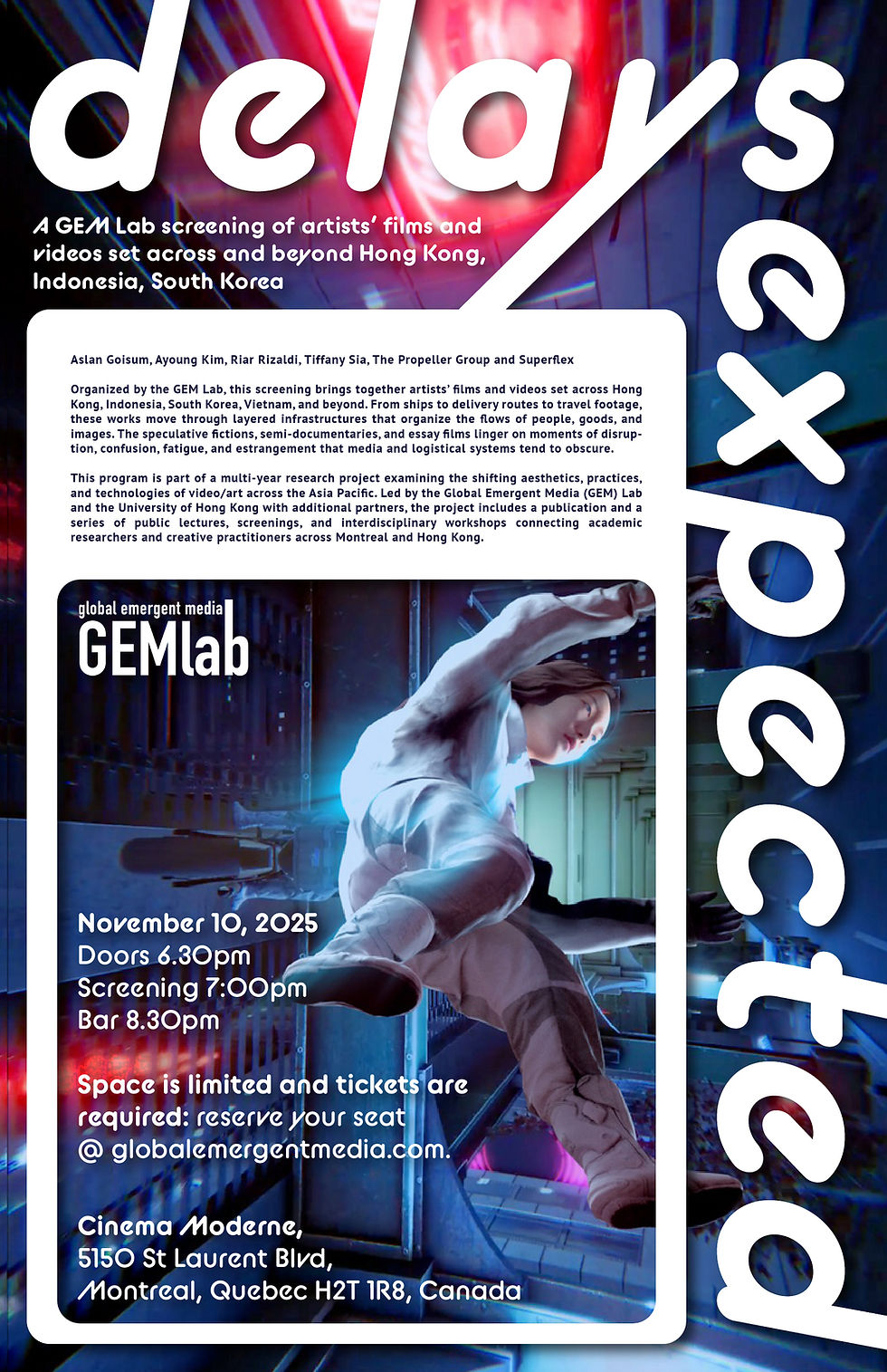Works-in-Progress: The Greatest Wait
- GEM LAB

- Oct 29, 2018
- 4 min read
Updated: Nov 15, 2019
Thursday, November 22, 2018 at 6 PM – 7:30 PM in the GEM Lab (FB 630.15)

A VR experimental film investigates the Palestinian exilic condition in the story of impossible eternal return to Palestine through Google Streetview VR. Zei, a passport-less third-generation Palestinian refugee, travels the world through Streetview VR to trace her family’s forced migration. Geographies collapse, hystories too, as she experiences interconnected events between Haifa, Beirut and Montreal in the 1940s, 90s and 2020s. Why is a girl who grew up in Lebanon and currently living in Canada - connected to Palestine? Or was she rather just disconnected from it? Zei experiences an undeniable emotional, even bodily, connection to a place she has never lived in before. This marks the film’s first tension: emotional-geographical (dis)connection. I use "(dis)connection" as such to highlight the constant flux between connection and disconnection that captures the nuance of our mind-body existence. The film’s use of virtual reality formally carries this tension. VR deeply connects to a place we cannot inhabit, an immersive yet bodiless medium. On the flipside, if developed with spatiality in mind, VR can reconnect us to our body. It is this play between entrapment and spatial-physical reconfiguration that will carry the exploration of Zei’s search of her place. The film also explores the nature of memory as a phenomemon of the present, connected to the past and future alike - as the cinematic image is. It proposes memory both as a construction and reconstruction – a (re)construction – and so filmmaking as a (re)creation. The film’s narrative will be developed by colliding personal stories, my own family hystories, collective Palestinian hystories, my grandma’s bedtime stories and the landscape of Streetview as a place and a set of images; marking the second tension of the film: memory as a constant negotiation between “reality” and the imaginary. Zei is struggling with the same throughout the film. Are these her grandmother’s memories of Haifa, or is this her own return? Is it both? She comes back to Haifa to realize traces of her grandmother never really left the city, and that she bears a trace of her too. The interactive gaze of the user will expand the imaginary and contribute to the film’s narrative search. Structurally, the film collapses past, present and the perpetual future of eternal return to uncover the inter-generational, extra-geographical ripple of forced displacement. With spatial-perspectival manipulation, the audience is prompted to move their body and/or gaze; the film will use the latter to edit between different times and places. What is the physical feeling of nonlinearity? Politically, the film hopes to reveal that our relationship to place – physical, digital and virtual – are perpetuations of each other: commenting on tools of consumption of locations like Streetview, the digital gap and inaccessibility to the land. The film also hopes to make a mark towards the demilitarization of VR by making content that is politically critical and formally challenging the colonial worldview of place by changing our interaction with virtual space from a Euclidean to a holistic one. This transition in the concept of space is key in shifting Zei’s narrative search to a non-narrative one: her attempt to make sense of her story leads her into an endless map; in her wandering she realizes she is not looking for a location after all. Whatever it is she’s in pursuit of, requires a shift in her understanding of what "her place" is. Razan is a filmmaker and media artist living and working between Beirut, Lebanon and Montreal, QC, Canada. She is the 2018 Knight Foundation New Frontier Fellow at Sundance Film Festival and was awarded the Barbara Aronofsky Latham Award for an Emerging Experimental Video Artist at the 2018 Ann Arbor Film Festival. Razan’s work has screened and exhibited at HotDocs Film Festival, Rencontres Internationales du Documentaire de Montreal, Melbourne International Film Festival, Glasgow International Film Festival, Ann Arbor Film Festival, Blackstar Film Festival, New Filmmakers New York, Anthropologies Numériques, Boston Museum of Art, Tokyo Photographic Art Museum, Flux Factory New York and Vox Populi Philadelphia and is in the permanent collection of the Sursock Museum in her hometown Beirut, Lebanon. Her latest short film, "your father was born 100 years old, and so was the Nakba" won the Sunbird Award for Best Narrative Short at Days of Cinema Palestine 2018 and has been acquired by the Palestine Films Collection. She was a 3-year Fulbright scholar pursuing my MFA in Film and Media Arts at Temple Universty in Philadelphia. She mentored at the CAMRA Doc Fellows Program at the University of Pennsylvania and was invited to teach at different universities as a visiting artist including Duke University and Princeton University. She now teaches Intermedia and Moving Images at Concordia University in Montreal. About WIP: The workshop is meant to showcase new and developing projects by the Fine Arts graduate community (and beyond), creating a space for interdisciplinary critique and feedback. Encouraging the engagement of workshop participants, the emphasis will be on research methodologies and future directions. We aim to create a space for alternative methodologies and practices, investigating research trends in the humanities such as visual anthropology, digital ethnography, field recording and sound experiments, approaches to information technologies, and other on the ground research practices. - Patrick Brodie, Patrick Smith, and Viviane Saglier



Comments